U.S. multinational corporations were actually hiring in 2011 as they were in 2010. Unfortunately as in 2010, they are hiring abroad. In an updated BEA summary on sales, investment and employment by Multinational Corporations for 2011, we have a 0.1% increase in hiring for jobs in the United States while MNCs increased their hiring abroad by 4.4%. Graphed below are multinational corporation employees residing in the United States, scale on the left, against multinational corporation employees located abroad, scale on the right. As we can see multinational corporations are clearly reduced their staff in the U.S. while increasing it in foreign nations. In other words, multinational corporations are not just offshore outsourcing to external, 3rd parties, but also offshore outsourcing American jobs directly.
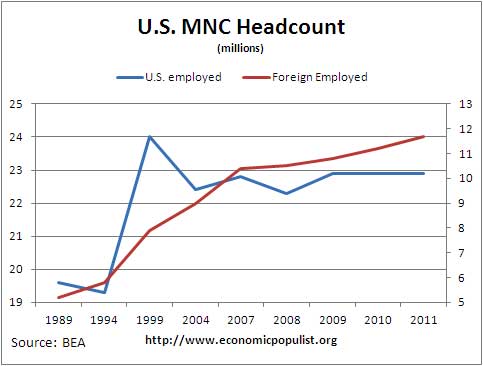
This is the third year in the row for hardly any growth in U.S. payrolls by these multinational firms. Yet while America goes hurting for jobs, we see multinationals are doing plenty of hiring, just in other countries.
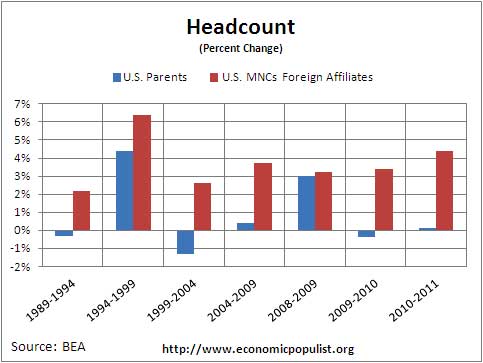
Worldwide employment by U.S. multinational companies (MNCs) increased 1.5 percent in 2011 to 34.5 million workers, with the increase primarily reflecting increases abroad. In the United States, employment by U.S. parent companies increased 0.1 percent to 22.9 million workers, compared with a 1.8 percent increase in total private industry employment in the United States. The total employment by U.S. parents accounted for roughly one-fifth of total U.S. employment in private industries. Abroad, employment by majority-owned foreign affiliates of U.S. MNCs increased 4.4 percent to 11.7 million workers.
U.S. multinationals accounted for 20.9% of U.S. private sector payrolls in 2011, 21.8% in 1989. Yet from 1989 to 2011, U.S. MNCs decreased their employment in the United States by 3.3 million workers while expanding employment abroad by 6,5 million employees. The share of employment by MNCs in the United States went from 79% of their total employees in 1989 to 66.3% by 2011. Multinational corporations are clearly doing their hiring abroad.
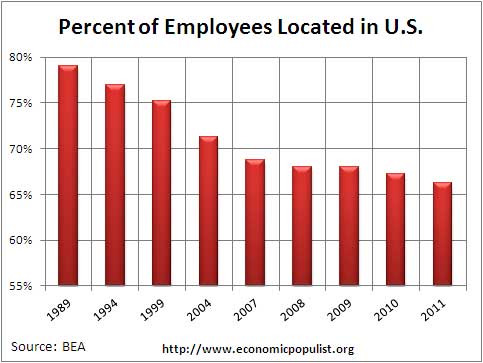
Clearly much of this is due to outsourcing. Multinationals do hire in foreign nations as they expand into new foreign markets. For example, GM sells cars in Brazil and China and Heinz sells ketchup in Europe. Multinational implies global operations and sales around the world, so of course they would be hiring in the markets these businesses are operating in. Yet below is a graph of multinational sales by domestic, scale on the left and foreign breakdowns, scale on the right. While sales have clearly increased globally, they are not proportionate to the decline in American workers being hired. Additionally, one would hope that U.S. multinationals would be producing in the United States, thus hiring American workers and exporting. Yet from the trade deficit alone plus the personnel figures and capital investments that appears to be improbable.
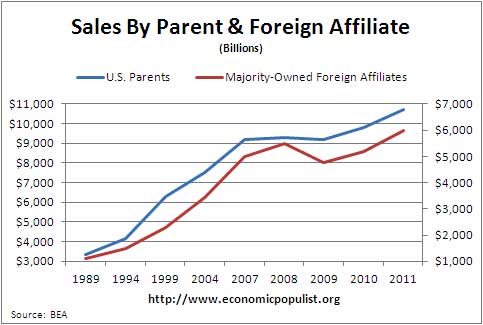
U.S. sales for these multinationals are 1.8 times more than all of their foreign operations in U.S. dollars. That fact also points to simply offshore outsourcing much of their operations to labor arbitrage the American worker. Below is the percentage change in domestic and foreign sales for select years of U.S. multinationals. Again, notice the disproportionate change in comparison to the two employee graphs above.
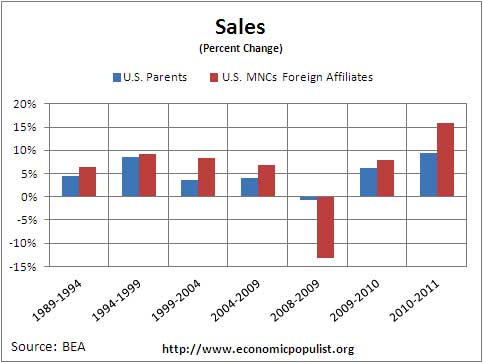
Capital expenditures by domestic and foreign breakdowns are also disproportionate to multinational corporate payrolls. Corporations buy assets, such as new buildings, equipment, land and construction of manufacturing plants. By U.S. dollars these sorts of purchases can be much cheaper abroad. Still, by dollar amounts, multinationals' capital expenditures are much greater for their United States locations than their foreign subsidiaries. If expansion into foreign markets explained the loss of American employees, we would expect capital expenditures to follow.
Worldwide capital expenditures by U.S. MNCs increased 16.7 percent in 2011 to $706 billion. Capital expenditures in the United States by U.S. parent companies increased 17.1 percent to $514 billion. Capital expenditures abroad by their majorityowned foreign affiliates increased 15.4 percent to $192 billion.
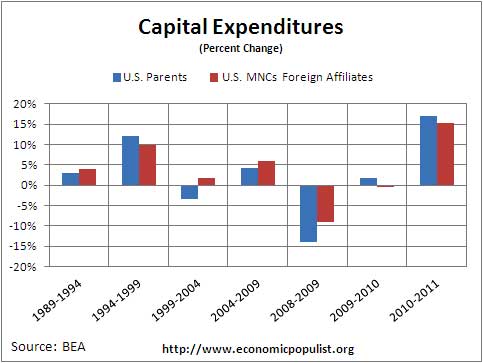
It is clear U.S. multinational corporations have abandoned the American worker. What about foreign businesses operating in the United States? For 2011, foreign corporations were better to Americans than their own U.S. ones as they increased payrolls in America by 3.3% in 2011. Yet if one looks at the historical graph, these foreign controlled corporations operating the United States simply hired back to their precession levels.
Employment in the United States by majority-owned U.S. affiliates of foreign MNCs rose 3.3 percent, to 5.6 million workers, in 2011, a rate of increase higher than the 1.8 percent increase in total U.S. private-industry employment in 2011. U.S. affiliates accounted for 5.0 percent of U.S. private-industry employment in 2011, one-tenth of a percentage point higher than in 2010.
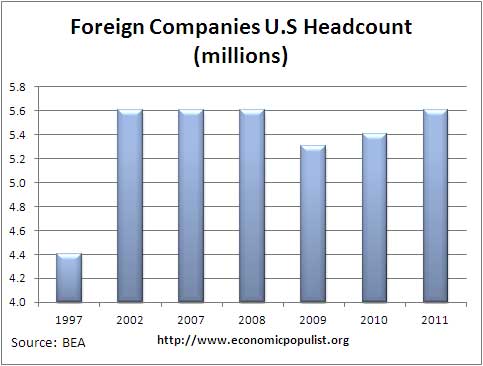
Bear in mind these statistics are for foreign subsidiaries of U.S. multinational corporations where they hold a majority stake. There are many more American jobs lost due to offshore outsourcing. The Indian BPO industry continues to expand at alarming rates and most I.T. and many manufacturing processes are contracted out to outsourcing companies. Those figures do not show up in these statistics for U.S. multinationals do not own a majority stake of those various outsourcers.
This article is an update to multinational corporations hiring abroad, covering the 2010 statistics.

Recent comments